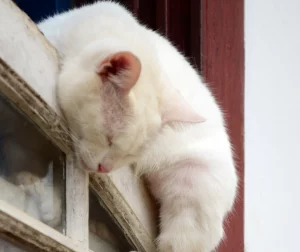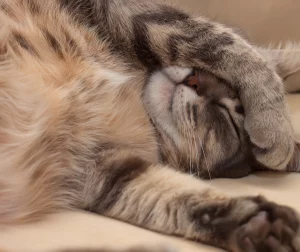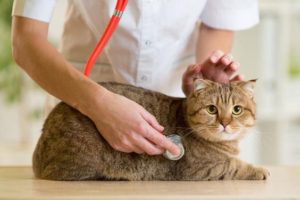If you have a cat, you have probably noticed that they can sleep for long periods of time. It is not uncommon for cats to sleep up to 16 hours or more in a day, leaving many owners wondering why their feline friends seem to be sleeping more than usual. This is a common question among cat owners and it is important to understand the reasons behind this behavior. In this article, we will explore the topic of why cats sleep more than usual and provide some insights into their sleeping habits.

How long do cats sleep?
Before delving into why cats may sleep more than usual, it is important to understand how much sleep is considered normal for these furry creatures. On average, cats sleep for about 12 to 16 hours a day. However, this can vary depending on factors such as age, health, and environment. Adult cats tend to sleep less than kittens, who require more sleep for growth and development. Furthermore, indoor cats may sleep more than outdoor cats due to less physical activity and stimulation.
Cats typically have three types of sleep; short naps, deep sleep, and REM (Rapid Eye Movement) sleep. Short naps, also known as catnaps, usually last for about 15-30 minutes. Deep sleep, on the other hand, lasts for about 6-7 minutes and is characterized by slow breathing and relaxed muscles. During REM sleep, which is the stage where dreams occur, cats may twitch, move their paws, or even make noises. This cycle of short naps, deep sleep, and REM sleep continue throughout the day until they wake up.
Cats sleep more than usual due to stress
One possible reason for a cat to sleep more than usual is due to stress. Cats are known to be sensitive creatures and can easily get stressed by changes in their routine or environment. This can be anything from moving to a new house, a new addition to the family, or even loud noises in the surroundings. When cats are stressed, they tend to seek comfort and solace in sleep. Therefore, if your cat is sleeping more than usual, it may be a sign that they are experiencing stress.
To help reduce stress levels and promote a healthy sleeping pattern, cat owners should try to maintain a stable and calm environment for their feline friend. Providing them with a space of their own where they can retreat when needed can also help reduce stress levels. Additionally, engaging them in interactive playtime and regular grooming sessions can help keep them mentally stimulated and relaxed.
Signs of stress in cats
- Hiding or avoiding interaction
- Loss of appetite
- Aggression or excessive grooming
- Changes in litter box habits
Cats sleep more than usual due to obesity

Obesity is another potential reason for cats to sleep more than usual. Since overweight cats are less active, they tend to spend most of their time sleeping. Obesity can also lead to several health issues such as diabetes, heart problems, and joint pain, which can make it difficult for cats to move around and be active. Therefore, they may resort to sleeping more to avoid any discomfort or pain caused by their weight.
As a cat owner, it is important to monitor your cat’s weight and provide them with a balanced diet and regular exercise to prevent obesity. If your cat is already overweight, consult with a veterinarian to create a weight loss plan that is safe and appropriate for your furry friend.
Signs of obesity in cats
- Difficulty in breathing
- Difficulty in grooming
- Visible fat deposits in certain areas of the body (e.g. abdomen)
- Reluctance to engage in physical activities
Cats sleep more than usual due to old age
Just like humans, cats tend to sleep more as they age. As cats enter their senior years, they may start to experience a decline in energy levels and overall health. This can lead to longer periods of sleep to conserve energy and promote healing. Older cats may also have difficulty regulating their body temperature, which makes them seek out warm and comfortable spots to sleep.
If your cat is a senior, it is essential to provide them with a cozy and warm environment to rest in. Senior cats may also need some assistance in grooming and maintaining their hygiene, so regular grooming sessions may be necessary.
Signs of old age in cats
- Decrease in activity levels
- Difficulty in climbing or jumping
- Loss of appetite or weight loss
- Changes in behavior (e.g. increased vocalization)
Cats sleep more than usual due to depression
Depression is a common problem among cats, especially those who have experienced trauma or have been through major changes in their lives. When cats are depressed, they may feel lethargic and uninterested in activities that they usually enjoy, leading to more frequent naps. It is essential to address any potential sources of stress or trauma in a cat’s life to prevent depression.
Providing a loving and stable home, engaging in bonding activities such as grooming and interactive play, and seeking professional help if needed, can all help alleviate depression in cats.
Signs of depression in cats
- Lack of interest in food or activities
- Withdrawal from social interaction
- Changes in sleeping patterns
- Excessive licking or grooming
Cats sleep more than usual due to weather

Cats are known to be sensitive to changes in weather, particularly when it comes to extreme temperatures. During hot weather, cats may sleep more to avoid overheating, while in cold weather, they may sleep to retain body heat. Additionally, cats may feel less energetic during the shorter days of winter, leading to more sleep. So, it is not uncommon for cats to sleep more than usual during certain seasons.
As a cat owner, make sure to provide your furry friend with a comfortable and warm space during cold weather, and a cool and shaded spot during hot weather. Keeping them hydrated is also vital in extreme temperatures.
Signs of heatstroke in cats
- Excessive panting
- Lethargy and weakness
- Vomiting or diarrhea
- Difficulty in breathing
Cats sleep more than usual due to viral infections
Another reason for excessive sleeping in cats could be due to viral infections. Cats are susceptible to various viruses, such as feline immunodeficiency virus (FIV) and feline leukemia virus (FeLV). These viruses can weaken the immune system and cause fatigue, leading to longer periods of sleep.
It is essential to keep your cat up to date on their vaccinations and schedule regular vet check-ups to detect any potential infections early on. It is also important to monitor your cat’s behavior and take note of any changes that may indicate an underlying health problem.
Signs of viral infections in cats
- Loss of appetite
- Weight loss
- Weakness and lethargy
- High fever
Things to consider when your cat sleeps more than usual

While it is perfectly normal for cats to sleep for long periods of time, it is crucial to pay attention to any significant changes in their sleeping habits. If you notice that your cat is sleeping excessively or experiencing other symptoms, it is best to consult with a veterinarian to rule out any underlying health issues.
Additionally, providing a comfortable and safe environment, regular playtime and grooming, and maintaining a balanced diet can all help promote healthy sleeping habits in cats.
Conclusion
In conclusion, cats sleep more than usual for various reasons, including stress, obesity, old age, depression, weather changes, and viral infections. As a cat owner, it is important to understand your cat’s sleeping habits and monitor any changes that may indicate an underlying health issue. By providing a loving and stable environment and addressing any potential sources of stress, you can help promote healthy sleeping patterns in your feline friend. Remember to always consult with a veterinarian if you have any concerns about your cat’s sleeping habits or overall health.
